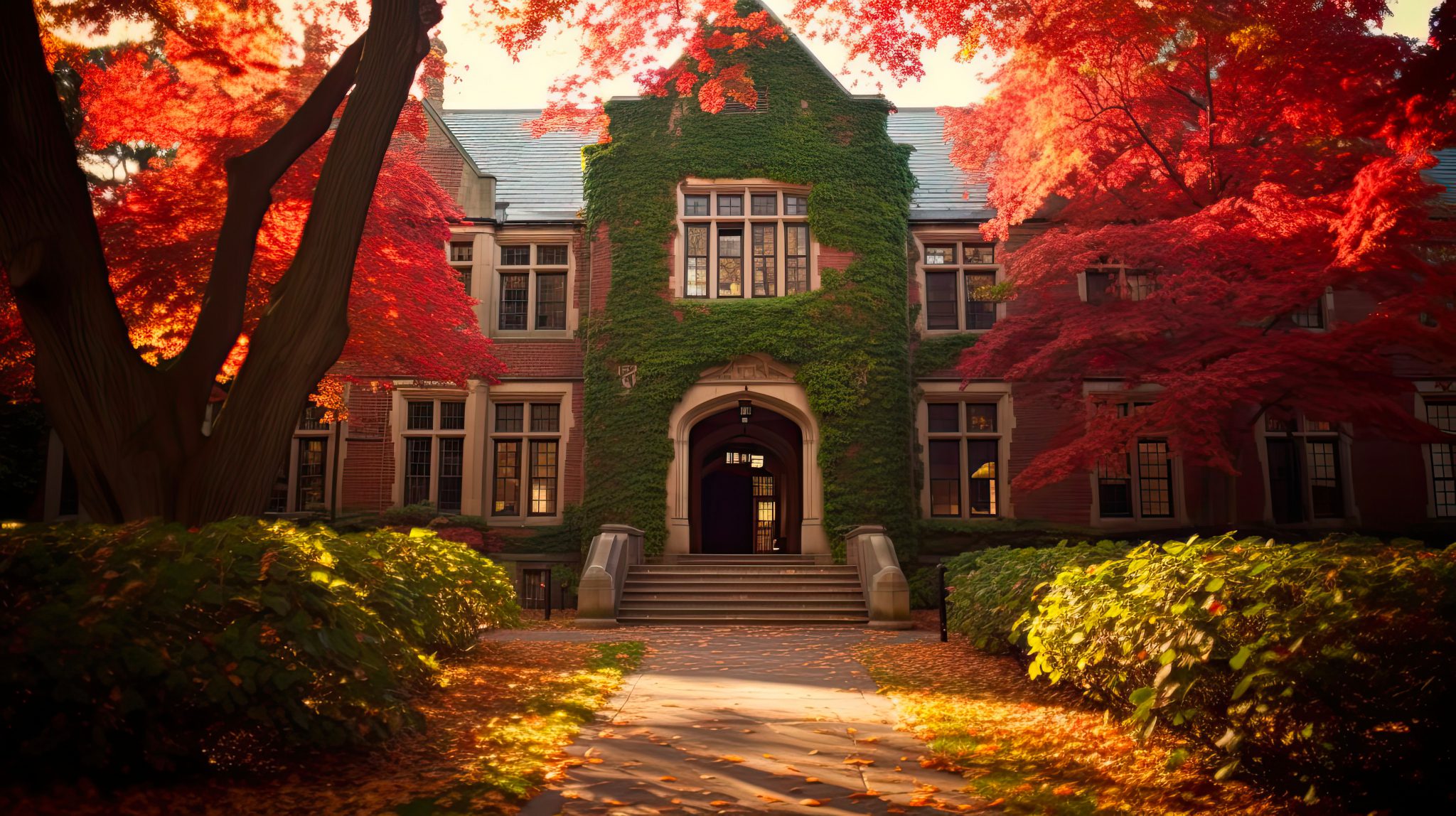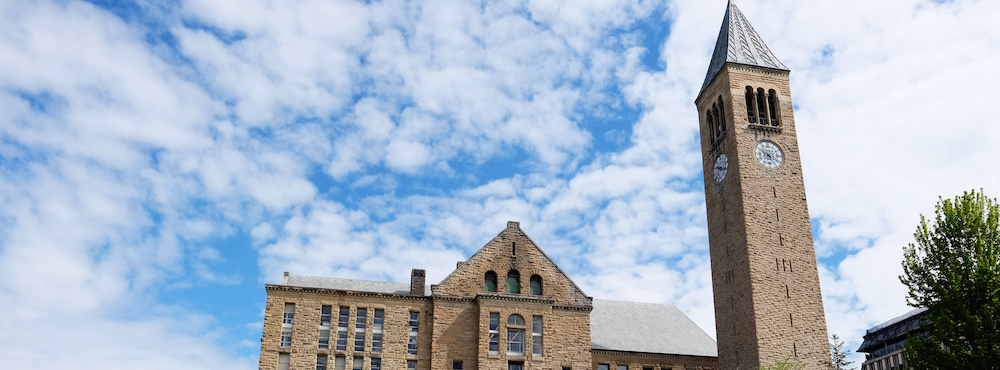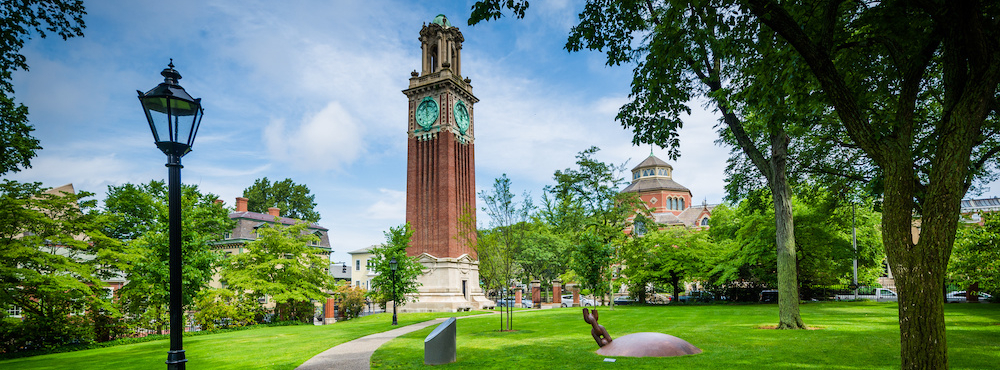Learn more about navigating Ivy League admissions from our IvyWise counselors by registering for these free IvyWise webinars:
The term “Ivy League” often conjures images of ivy-covered buildings, academic prestige, and a long lineage of influential alumni. But what exactly defines an Ivy League school and why do these institutions hold such an esteemed reputation in the world of higher education? Why are Ivy League rankings among the highest globally? And is the Ivy League worth it? We’ll explore what sets these schools apart and why they continue to hold such a powerful place in the world of higher education.
Introduction to the Ivy League
The Ivy League is a group of eight elite private colleges and universities in the northeastern U.S., known for their academic excellence, selective admissions, and historic significance. The eight schools are: Harvard University (Cambridge, MA), Yale University (New Haven, CT), Princeton University (Princeton, NJ), Columbia University (New York, NY), University of Pennsylvania (Philadelphia, PA), Dartmouth College (Hanover, NH), Brown University (Providence, RI), and Cornell University (Ithaca, NY).
Why Are the Ivy Leagues So Prestigious?
The Ivy League reputation is one of the most prestigious in the U.S. and the world for several reasons:
- Academic rigor: They offer a world-class education with renowned faculty and cutting-edge research opportunities.
- Historical significance and legacy: Ivy League history began when Harvard was established in 1636. Most of the Ivies were founded before the American Revolution and have long-standing traditions of excellence and a deep-rooted influence in U.S. history.
- Selective admissions: Admission rates are extremely low — among the lowest in the U.S., in fact — making acceptance highly competitive.
- Influential alumni: Graduates include U.S. presidents, Nobel laureates, CEOs, cultural icons, Olympic medalists, and other prominent figures.
- Resources and networks: Ivy League schools have some of the largest endowments in the world, as well as extensive libraries and state-of-the-art facilities.
What’s the difference when it comes to Ivy League vs non-Ivy League schools that are also top tier, like Stanford, MIT, Caltech, and the University of Chicago? While all these institutions offer world-class education, the term “Ivy League” carries a unique cachet that few other schools can match.
Ivy League Admissions: An Overview
The Ivy League application process is like that of most other U.S. colleges and universities. Students typically submit their application, personal statement and essays, letters of recommendation, a high school transcript, and standardized test scores. You may need to submit additional materials if you are applying to a particular school or program.
Check out our comprehensive Ivy League admissions guides:
Depending on which school and/or program you apply to, you may be invited to an admissions interview. Brown and Columbia do not offer interviews as part of the undergraduate admissions process. At Cornell, students who apply to the architecture program are required to attend a video interview. Dartmouth, Harvard, Princeton, and Yale all offer optional interviews, dependent on interviewer availability.
What Makes a Student Eligible for Ivy League Schools?
Ivy League eligibility depends on several factors, including strong academic performance, a compelling college application, and extracurricular activities. Universities at this level typically favor a good GPA, strong SAT or ACT scores, challenging coursework, as well as standout personal statements, essays, and letters of recommendation.
Increasing Your Chances of Acceptance
It goes without saying that your academic record is a key part of Ivy League eligibility and admissions. It’s important to maintain good grades, take the most rigorous courses available to you, and achieve strong standardized test scores. So, does getting into Ivy League schools mean you have to achieve perfect grades and test scores? That’s one of the most common Ivy League myths. The truth is that admissions committees don’t expect you to be perfect.
It’s vital to show intellectual curiosity and academic depth, which you can demonstrate by conducting independent research projects, participating in academic competitions, self-studying advanced topics, or taking college-level courses outside of high school. And while it’s a popular myth that colleges want well-rounded students, Ivy League and other schools really look for specialists who excel in one or two specific areas.
Outside of academics, Ivy League schools look for students who cultivate meaningful extracurricular involvement. This means prioritizing depth and impact by committing to only a few activities you’re truly passionate about. Seek out and take on leadership roles within these activities. Use your summers wisely for internships, research, community service, outside reading, and/or pre-college programs.
Financial Planning for Ivy League Education
Ivy League financial aid options are robust due to their large endowments, making tuition surprisingly affordable for middle- and lower-income families. In fact, they are committed to helping students graduate with little to no debt and — with the exception of Cornell — meet 100% of demonstrated financial need through grants, Ivy League scholarships, and work-study programs instead of loans.
All Ivies practice need-blind admissions for U.S. citizens and permanent residents. This means that your ability to pay for college is not considered during the admissions decision process. If you are admitted, your financial need will then be assessed.
These financial aid policies differentiate the Ivy Leagues from most other colleges and universities that often practice need-aware admissions and may not meet full demonstrated need. For colleges that do meet 100% of demonstrated need, loans are often included in the financial aid package.
Ivy League Financial Planning Strategies
With some strategic planning, many families can significantly reduce the cost of Ivy League tuition. The key is to understand how your Student Aid Index (SAI) is calculated so you can position your finances to maximize need-based aid. Your SAI is determined by information from the FAFSA and the CSS Profile and is calculated based on parental income and assets, student income and assets, and the number of children in college.
Being meticulous during the financial aid application process is also crucial. Here are some tips:
- File the FAFSA and CSS Profile early and accurately. These applications are critical for determining your need-based aid. Missing deadlines or making errors can delay or reduce your aid.
- Be prepared for verification. Financial aid offices may request additional documentation (tax returns, W-2s, bank statements) to verify the information you’ve provided. Respond promptly.
- Communicate unique circumstances. If your family has unusual medical expenses, job loss, or other significant financial changes not fully captured by the FAFSA/CSS Profile, contact the financial aid office directly. They often have professional judgment policies to adjust your aid package.
- Appeal if necessary. If you feel your aid package doesn’t accurately reflect your family’s ability to pay, you can appeal the decision. Be prepared to provide clear documentation and a compelling explanation of your circumstances.
While these strategies can help you get as much financial aid as possible from Ivy League schools, don’t forget other sources of aid. Savings accounts, such as a 529 plan, and external scholarships can also help with college costs.
The Academic and Extracurricular Landscape of Ivy League Schools
Beyond the stellar reputations and historic campuses, a deeper understanding of Ivy League schools requires an exploration of the unique academic and extracurricular landscapes that define them.
Ivy League Academic Programs
While all Ivy League schools excel across a wide range of disciplines, each school has developed strengths in specific academic programs. Across the board, all Ivy Leagues offer excellent computer science, social sciences, and humanities programs. Aside from these, let’s look at what each school does best:
- Brown University: Known for its Open Curriculum, Brown offers highly regarded economics, biology, international relations, political science, and applied mathematics programs, as well as the highly competitive Program in Liberal Medical Education (PLME) — a combined bachelor’s and M.D. program.
- Columbia University: Home to one of the best graduate schools of journalism in the world, Columbia also has strong MBA and law programs and excels in political science and economics.
- Cornell University: Students at Cornell can take advantage of excellent programs in engineering, hospitality administration, agricultural sciences, food sciences, and programs in the College of Architecture, Art, and Planning.
- Dartmouth College: Known for its strong undergraduate focus, Dartmouth offers top programs in economics, government, engineering sciences, and biology. It’s also known for its professional schools in business and medicine.
- Harvard University: Not only does Harvard have graduate programs in business, law, and medicine that are among the best in the world, it also has exceptional programs in government, economics, and psychology.
- Princeton University: Strong majors at Princeton include economics, engineering, public administration, social services, and natural sciences.
- University of Pennsylvania: In addition to having one of the top business schools in the world, UPenn is known for nursing, biomedical sciences, education, biology, and engineering.
- Yale University: Strong Yale programs include nursing, medicine, management, art, drama, and music. The law school is also highly ranked.
Ivy League Extracurriculars
Active participation in extracurriculars shapes Ivy League student experiences and reinforces the dynamic, engaged atmosphere that Ivy League institutions are known for. Extracurricular activities provide crucial opportunities for Ivy League students to connect with peers who share similar interests. Additionally, students develop practical skills and leadership experience that complement their academic learning, contributing to a well-rounded education. Participating in clubs and organizations can also give students access to alumni networks, faculty, and community leaders, which may open doors to additional opportunities.
Ivy League Sports
Ivy League history includes its impact on American sports. In fact, the term “Ivy League” itself originated from an athletic conference. Early forms of American football and other sports were developed and popularized on Ivy League campuses. Historic rivalries, such as the Harvard-Yale football game (“The Game”), are deeply woven into the fabric of the universities and are major cultural events on campus, drawing alumni and fans for generations. These rivalries promote a strong sense of tradition, school spirit, and camaraderie.
While the Ivies are highly competitive NCAA Division I institutions, their philosophy prioritizes academics and the “student-athlete” model above all else. Unlike many major college sports programs where athletics can sometimes overshadow academics, the Ivies maintain a firm stance that athletes are first and foremost students. This philosophy guides admissions, financial aid (no athletic scholarships), and the overall scheduling of athletic activities to ensure they remain compatible with rigorous academic pursuits.
Ivy League Campus Life and Student Experiences
While each Ivy has its own distinct culture, some common threads define campus life across each institution, including intellectual intensity and engagement, residential life and community, a diverse and active extracurricular scene, and support systems and resources. While academics are demanding, Ivy League students also know how to unwind and socialize. Weekends often involve a mix of studying, extracurriculars, and social events.
- Academic: Students at all the Ivies are immersed in an environment of active learning and intellectual discourse. Class discussions are often lively, and students are expected to engage deeply with challenging material. Additionally, students have access to extensive libraries, state-of-the-art research facilities, and diverse academic programs.
- Residential: Most Ivy League schools have robust residential systems, particularly for first-year students and often continuing into upperclassman years (like Harvard’s House system or Yale’s Residential Colleges). These systems create smaller, supportive communities within the larger university and give students a feeling of belonging.
- Extracurricular: Ivy League extracurriculars include hundreds of student-led clubs and organizations on each campus that cover virtually every interest imaginable — from political action and community service to performing arts, cultural groups, academic societies, and niche hobbies. Students are highly encouraged to take on leadership roles within these organizations, developing practical skills in management, event planning, and teamwork.
- Resources and Support: Recognizing the pressures and challenges students face, the Ivies offer a wide range of support services that include mental health counseling, career services, writing centers, and academic advising and tutoring. One powerful aspect of the Ivy League experience is the lifelong connection to a vast and influential alumni network, which provides mentorship, career opportunities, and a sense of belonging long after graduation.
The social scene is an important part of Ivy League student experiences and varies across campuses. UPenn and Columbia for example, take advantage of their urban locations for off-campus social and cultural opportunities. Princeton’s social scene revolves around its 11 co-ed eating clubs. Cornell and Dartmouth are both known for their active Greek life.
Ivy League Diversity and Inclusion
Ivy League institutions have long articulated a strong commitment to diversity and inclusion, viewing it as essential to their educational mission and the development of future leaders. Even after the 2023 affirmative action ruling, Ivies actively seek to recruit students from a wide range of backgrounds, including underrepresented racial and ethnic groups, first-generation college students, low-income students, rural students, and those with diverse geographic and life experiences.
Additionally, students can find cultural centers (e.g. Asian American Cultural Center, Black Cultural Center, Latino Cultural Center, Native American Cultural Center, LGBTQ+ Centers), events, and programs on each campus that promote cross-cultural understanding. These resources provide support and community for students from various identity groups.
Ivy League Networking and Career Opportunities
Beyond academic rigor, the Ivy League reputation encompasses networking and career advancement opportunities. This is achieved through a combination of dedicated career services, the inherent quality of the student body, and vast and influential alumni networks. Ivies are prime recruiting grounds for top companies across a variety of sectors and host numerous career fairs.
Each Ivy League school has a sophisticated career services office (e.g., Harvard’s Mignone Center for Career Success, Yale’s Office of Career Strategy) to help prepare students for the workforce. Students can receive individualized counseling, resume assistance, interview preparation, and tailored guidance based on their interests and career goals. Additionally, career services host panels and workshops that feature alumni and industry leaders.
Alumni Networks
Ivy League alumni networks span virtually every industry, profession, and geographic location worldwide. Alumni often help students at their alma mater through job referrals and leads, informational interviews, mentorship, and internship opportunities. Additionally, many Ivies maintain physical alumni clubs in major cities and countless regional and special interest groups. These clubs host networking events, social gatherings, and professional development workshops, providing continuous opportunities for connection.
Debunking Ivy League Myths
The Ivy League has become a powerful, almost mythical, symbol of elite education, prestige, and guaranteed success. This mystique, however, is often built on a foundation of common misconceptions that can significantly affect how prospective students perceive these institutions and their own potential. Let’s look at these common myths.
Myth #1: Ivy League Admissions Requires Perfect Grades and Test Scores
This is perhaps the most pervasive and anxiety-inducing myth. It suggests that only students with a 4.0 GPA, perfect SAT or ACT scores, and a laundry list of APs will be eligible for Ivy League admissions. This myth can be incredibly discouraging to prospective students with strong, but not “perfect,” academic profiles. They might feel they have no chance, leading them to self-select out of applying even when they would be competitive. It also puts immense, unhealthy pressure on students to achieve unattainable academic flawlessness, often at the expense of their well-being and genuine intellectual exploration.
The reality is thousands of applicants each year have perfect or near-perfect academic records and are still denied. Ivy League admissions are “holistic,” meaning they look beyond just numbers. They seek intellectual curiosity, unique perspectives, genuine passion, and what a student will contribute to the campus community. A student with a slightly lower GPA but compelling essays, significant impact in extracurriculars, and strong recommendations might be preferred over a “perfect” student who lacks a clear personal narrative or demonstrated passions.
Myth #2: Only Rich Students or “Legacies” Get In, and It’s Unaffordable
Many believe that Ivy League schools are exclusive clubs for the wealthy or for those with family ties (legacy status), and that the high sticker price makes them financially out of reach for most. This myth creates a significant barrier for talented students from less affluent backgrounds. They might mistakenly believe they can’t afford or won’t be considered by an Ivy League school, preventing them from applying and missing out on an opportunity that could be highly affordable and transformative.
The reality, as we already mentioned, is that all Ivy League schools practice need-blind admissions for domestic students and meet 100% of demonstrated financial need. This means for many lower and middle-income families, an Ivy League education can be more affordable than a state university, as their aid packages primarily consist of grants that don’t need to be repaid. And while legacy status can offer a slight boost at some Ivies — though its impact is debated and changing after recent court rulings — it’s far from a guarantee, and the vast majority of admitted students are not legacies.
Myth #3: An Ivy League Degree Guarantees Success, and Other Schools Aren’t as Good
A belief persists among some that an Ivy League degree is a golden ticket to a high-paying job, immense success, and a fulfilling life, and that anything less is a failure. Conversely, non-Ivy League schools offer a “lesser” education. This myth may cause students to prioritize name recognition over choosing the best college for their academic interests, learning style, and social preferences. If they don’t get into an Ivy, they might feel like a failure, leading to disappointment and a sense of lost opportunity, even if they attend another excellent institution where they could thrive. This also perpetuates a narrow definition of what constitutes a “good” education.
While Ivy League schools open many doors, the reality is that success and fulfillment are ultimately determined by an individual’s drive, work ethic, and choices, not just their alma mater. There are thousands of exceptional universities across the U.S. and globally that offer world-class education, strong alumni networks, and equally bright career prospects. Finding your best-fit college is far more important than arbitrary prestige rankings.
Navigating Ivy League Admissions
Navigating the Ivy League admissions process can feel like a daunting task. However, with a clear understanding of the true essence of these institutions and a strategic, confident approach, aspiring applicants can maximize their chances and prepare for a successful educational journey.
Here are five tips for navigating Ivy League admissions:
- Understand the holistic review. While academic excellence is foundational, the Ivies seek intellectual curiosity, personal qualities, leadership potential, and the unique contributions you will bring to their diverse community. Identify your unique talents, passions, and achievements. How do these align with the values and offerings of the specific Ivy League schools you’re interested in? It’s important to demonstrate this alignment in your application.
- Cultivate authenticity and self-reflection. Don’t try to guess what admissions officers want to hear; instead, reflect deeply on your experiences, what drives you, and what you’ve learned. Use specific anecdotes and examples to illustrate your passions, resilience, and growth. Let your personality shine through. And don’t forget to get feedback on your essays from trusted mentors, teachers, or counselors, but ensure the final voice and content remain authentically yours.
- Prioritize depth over breadth. Commit deeply to a few extracurricular activities that genuinely interest you. Seek leadership roles, initiate projects, and demonstrate tangible impact. Identify an area where you demonstrate exceptional talent or dedication. This “hook” can be academic, artistic, athletic, entrepreneurial, or service-oriented. Excelling in one or two areas can make you memorable. Use your summers wisely to pursue internships, research, volunteer work, or independent projects that align with your passions.
- Build strong relationships. Cultivate strong relationships with teachers who know you well and can speak genuinely to your academic abilities, character, and contributions. Provide them with detailed information to help them write strong recommendation letters.
- Manage expectations. Understand that admission is incredibly competitive, and even highly qualified applicants are denied. This is not a reflection of your worth or potential.
Maximize Your Admissions Chances with IvyWise
Gaining admission to an Ivy League school requires years of preparation and strategic planning. Here at IvyWise, every college admissions counselor has had years of admissions committee experience at some of the top colleges and universities in the U.S. — including Ivy League schools — so they know how to position students to maximize their chances for acceptance. As a result of our counselors’ expertise, IvyWise students are five times more likely to get into top schools than the general applicant.
Get Started




